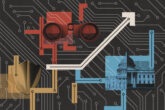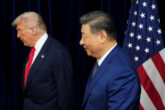May 01, 2023
To Restrict, or Not to Restrict, That Is the Quantum Question
Innovation power—the ability to invent, scale, and adapt emerging technologies—will determine which country prevails in the great power competition of the 21st century. Export controls accordingly assume a central position in the U.S. foreign policy toolkit, carrying the ability to significantly impact an adversary’s innovation potential. In October 2022, the Biden administration introduced semiconductor, artificial intelligence, and supercomputing-related export controls on China and has since hinted that similar restrictions on other technologies, including quantum information science, may soon follow.
Premature export controls could impede innovation and handicap U.S. companies.
U.S. policymakers are right to identify quantum information science as a critical technology area ripe for restriction, but introducing export controls now is likely to cause more harm than good.
Establishing U.S. leadership in quantum information science, which includes the subfields of quantum computing, quantum sensing, and quantum communications, ranks among the Biden administration’s highest national security priorities. Quantum technologies promise to dramatically increase computing power and speed, enabling machines to solve problems beyond the capacity of current-generation computers. They are also inherently dual use, meaning they can be applied to both military and civilian contexts.
Read the full article from Lawfare.
More from CNAS
-
Transatlantic Security / Technology & National Security
Look Before We Leap on Artificial IntelligenceThis article was originally published on The Dispatch. A debate about the role that artificial intelligence should and will play in society, and how it will affect humanity fo...
By Jon B. Wolfsthal
-
Technology & National Security
Caleb Withers on the Cybersecurity Frontier in the Age of AICaleb Withers, research associate at the Center for a New American Security, joins Kevin Frazier, the AI Innovation and Law Fellow at the University of Texas School of Law and...
By Caleb Withers
-
Technology & National Security
Prepared, Not ParalyzedExecutive Summary The Trump administration has embraced a pro-innovation approach to artificial intelligence (AI) policy. Its AI Action Plan, released July 2025, underscores t...
By Janet Egan, Spencer Michaels & Caleb Withers
-
Indo-Pacific Security / Technology & National Security
Sharper: Tech + ChinaRecent talks between President Donald Trump and Chinese Communist Party General Secretary Xi Jinping placed a spotlight on emerging technologies, from high-end chips to minera...
By Charles Horn & Sevi Silvia




